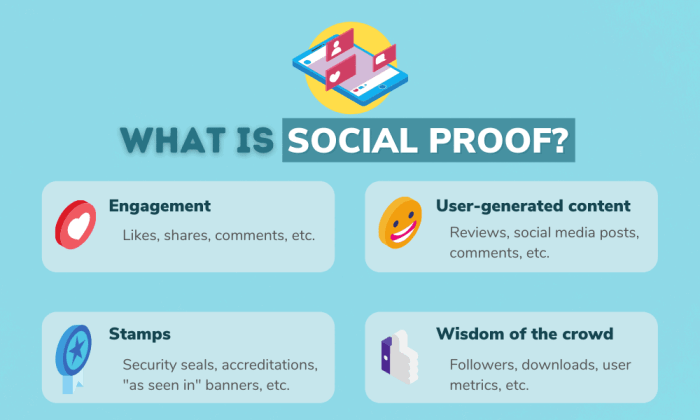Social Proof Strategies are the secret sauce to gaining trust and driving sales. Get ready to dive into the world of social proof with examples and tips that will revolutionize your marketing game.
Introduction to Social Proof Strategies
Social proof strategies are techniques used by businesses to showcase positive feedback, testimonials, or endorsements from satisfied customers to build trust and credibility with potential customers. This form of social influence leverages the power of word-of-mouth marketing to persuade others to make purchasing decisions.Utilizing social proof in marketing is crucial as it helps establish credibility, reliability, and trustworthiness for a brand or product.
By showcasing real experiences and feedback from existing customers, businesses can create a sense of authenticity and transparency that resonates with consumers. This can ultimately lead to increased sales, customer loyalty, and brand advocacy.
Examples of Companies Effectively Using Social Proof Strategies
- Amazon: Amazon prominently displays customer reviews and ratings on product pages, helping shoppers make informed purchasing decisions based on the experiences of others.
- Apple: Apple often features customer testimonials in its marketing campaigns, showcasing how their products have positively impacted the lives of users.
- Social Media Influencers: Influencers on platforms like Instagram and YouTube often promote products and services to their followers, leveraging their social proof to drive sales for brands.
Types of Social Proof

Social proof comes in various forms that businesses can leverage to build trust and credibility with their target audience. Let’s explore different types of social proof and how they can be effective in influencing consumer behavior.
Testimonials
Testimonials are statements from satisfied customers that endorse a product or service. They can be written or in video format, showcasing positive experiences and outcomes. Testimonials are effective as they provide real-life experiences that potential customers can relate to, building trust and credibility.
Case Studies
Case studies are in-depth analyses of how a product or service helped a specific customer solve a problem or achieve success. They provide detailed information on the benefits and results, offering concrete proof of the product or service’s value. Case studies are effective in showcasing the practical application and effectiveness of a business offering.
Influencer Endorsements
Influencer endorsements involve well-known personalities or celebrities promoting a product or service to their followers. Influencers have a loyal fan base that trusts their recommendations, making their endorsements powerful in influencing purchasing decisions. Leveraging influencer endorsements can help businesses reach a wider audience and tap into new markets.
Comparative Social Proof
Comparative social proof involves showcasing how a product or service is superior to competitors or alternatives in the market. This type of social proof highlights unique selling points, customer satisfaction rates, or awards received, positioning the business as a preferred choice among consumers.
Expert Social Proof
Expert social proof involves endorsements from industry experts, professionals, or thought leaders in a specific field. Their recommendations add credibility and authority to a product or service, influencing potential customers’ perceptions and decisions. Leveraging expert social proof can help businesses establish themselves as industry leaders and trusted sources of information.
Wisdom of the Crowd
The wisdom of the crowd refers to social proof based on the collective opinions, reviews, or ratings of a large group of people. This type of social proof relies on the principle that the majority’s opinion is more likely to be accurate, leading potential customers to trust the crowd’s judgment. Businesses can leverage the wisdom of the crowd through customer reviews, ratings, or user-generated content to showcase widespread approval and satisfaction.
Usage Social Proof
Usage social proof involves demonstrating how many people are currently using or benefiting from a product or service. This type of social proof creates a sense of FOMO (fear of missing out) among potential customers, motivating them to try the product or service to avoid being left behind. Businesses can showcase usage social proof through statistics, user counts, or live activity notifications to highlight popularity and demand.
Celebrity Social Proof
Celebrity social proof involves endorsements or associations with well-known celebrities or public figures. By aligning a brand with a celebrity, businesses can leverage their influence, credibility, and fan base to attract attention and build brand awareness. Celebrity social proof can help businesses reach a wider audience and enhance their brand image through the star power and appeal of the celebrity.
Implementing Social Proof on Websites
To effectively incorporate social proof elements on a website, it is important to strategically place them where they can be easily seen by visitors. This can include testimonials, customer reviews, star ratings, social media shares, and even user-generated content.
Best Practices for Displaying Social Proof
- Ensure social proof is visible on key pages such as the homepage, product pages, and checkout page.
- Use real and authentic testimonials or reviews from satisfied customers to build trust.
- Incorporate social media widgets to showcase likes, shares, and comments from followers.
- Create a dedicated section for customer stories or case studies to highlight success stories.
- Utilize trust badges and certifications to demonstrate credibility and reliability.
Examples of Websites Effectively Using Social Proof, Social Proof Strategies
- Amazon: Displays star ratings, reviews, and customer photos on product pages to help shoppers make informed decisions.
- Airbnb: Features guest reviews and ratings to build trust and credibility for hosts and properties.
- HubSpot: Showcases customer testimonials and case studies to highlight the success stories of businesses using their services.
- Casper: Utilizes customer testimonials and endorsements from reputable sources to reassure potential buyers about the quality of their mattresses.
Social Proof Tools and Platforms

When it comes to collecting and showcasing social proof, businesses have a variety of tools and platforms to choose from. These tools can help businesses build trust with their audience and increase conversions.
Popular Social Proof Tools
- 1. Trustpilot: Trustpilot is a popular platform that allows businesses to collect and display customer reviews and ratings. It offers a wide range of features, including customizable review widgets and in-depth analytics.
- 2. Yotpo: Yotpo is another tool that specializes in user-generated content. It allows businesses to collect and showcase customer reviews, photos, and Q&A on their website.
- 3. ProveSource: ProveSource focuses on real-time social proof notifications, such as recent purchases and sign-ups, to create a sense of urgency and credibility.
Choosing the Right Social Proof Platform
- Consider your specific needs: Before choosing a social proof platform, businesses should consider their goals and what type of social proof will be most effective for their audience.
- Features and integrations: Look for platforms that offer the features you need, such as customizable widgets, analytics, and integration with other tools like eCommerce platforms.
- Ease of use: Choose a platform that is user-friendly and easy to set up, so you can start collecting social proof quickly and efficiently.
- Pricing: Compare the pricing plans of different platforms to find one that fits your budget and offers the best value for your business.
